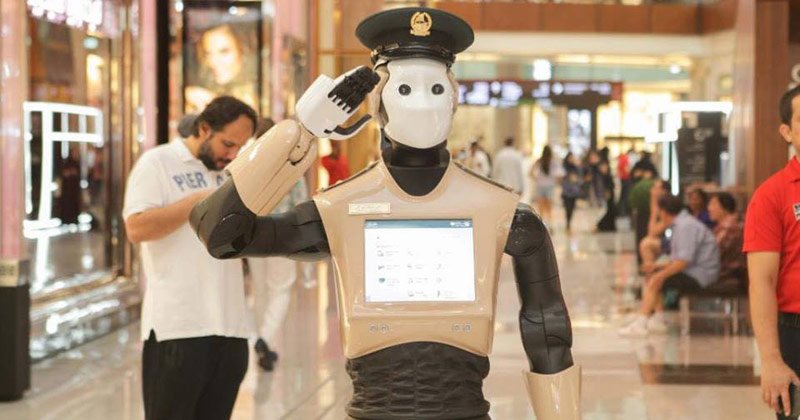Dubai recently inducted a robot police officer into its police force. While the reaction is varied, it is largely full of awe that a robot has been made a police officer.
According to The National, the robot in its initial phase is to be stationed at malls and tourist attractions where people can report crimes or pay traffic fines using a touchscreen on its body. The Dubai Police intends to later on extend its applications to chasing suspects and catching those who don’t pay parking fees in paid parking lots. The robot also is fitted with cameras to stream footage continuously to a command centre. A future batch of robots will be deployed for handling major crimes.
All said and done, this single robot means a lot to human society as a whole. It is not only about law enforcement, automation and jobs, but a whole lot of other things that can drastically change the way we live our lives.
Automation Is Key
Automation and getting a machine to do work greatly improves our efficiency, as individuals as well as organisations. Remember the time when a bus conductor had to manually count and tabulate the number of tickets sold and then report it? The system got an overhaul when electronic machines were introduced, reducing the workload on the staff, but didn’t eliminate the problem of conductors pocketing money. Then came the entirely automated system of prepaid cards and conductor-less transport, and the problem pretty much solved itself.
Similarly, when Indian police departments got smartphones to issue challans for traffic violations, it make the work easier for the police department, it did not do much to check bribes being taken by cops and letting people off. In fact, a report in The Hindu states that corruption levels rose by a huge margin.
With a robot handling things, it would reduce corruption a lot. A machine will not ask for a bribe unless it is programmed to do so. And if it is programmed to do so, it would be easy to find out who did it.
Automation has made a lot of things easier and improved transparency. Digitisation has made it easier to maintain records, catch offenders, and increase punishments for serial offenders.
More Jobs?
Automation also increases employment. A 2015 report in The Guardian says that automation has created more better-paying jobs as opposed to destroying them. In the context of the ‘Robocop’ in Dubai, it will certainly create more skilled jobs. The National reports that these robots will be trained to speak in various languages, issue violation tickets to offenders, accept crime reports and even carry heavy loads. People will have to work on the software, add new features, maintain the systems, etc. Further, other companies may develop their own product. This competition will definitely create more jobs for people in the information technology and electronics industry.
Focus on what matters
Now for the crucial part. If basic tasks such as general traffic policing and issuing tickets is taken care of by robots, humans can focus on more important tasks such as major crimes. This improves the efficiency of the entire force. Further, with the robot stated to get facial recognition systems soon, it can help recognise perpetrators and make things easier for the police force to both prevent crime, as well as catch criminals.
Automation in the law enforcement sector is a welcome step towards a better quality of living for humans. Given how crimes often go unsolved either due to understaffed polices forces or inept officials, the Dubai Police Robot may well be a role model for all of us to emulate in varying degrees.
Similar to how EVMs helped curb electoral crimes, robots too can do the same but to a larger extent. Imagine a troop of robots deployed in areas subject to left-wing extremism. Police officers can remotely monitor the system and take calculated steps in the event of an attack. While the robots are susceptible to attack, making them impervious to bullets would make it better to send them in rather than send in a human.
Dubai has shown the world that automation is indeed needed. The world should take heed of this and emulate atleast part of it.
Featured Image: The new Robot Police Officer in Dubai (Photo Credit: Dubai Police Smart Services Department)
![]()

